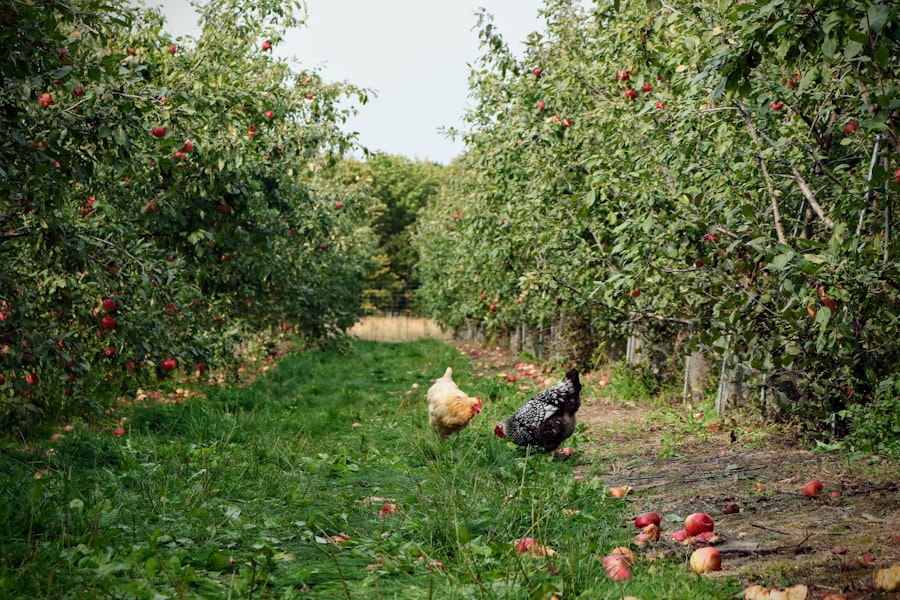Keeping chickens in residential areas has become increasingly popular in recent years, as more people are interested in sustainable living and having a source of fresh eggs. However, it is important to comply with the regulations set by the state of California to ensure the health and safety of both the chickens and the community. This article will provide an overview of the regulations on keeping chickens in California, the importance of understanding zoning laws, the requirements for chicken coops, choosing the right location for your coop, building a coop in compliance with regulations, maintaining your coop, and health and safety guidelines for your chickens.
Key Takeaways
- California has regulations on keeping chickens that must be followed.
- Understanding zoning laws is important when deciding to keep chickens.
- A chicken coop is essential for keeping chickens safe and healthy.
- California has specific requirements for chicken coops, including size and ventilation.
- Choosing the right location for your coop and maintaining it properly is crucial for the health and safety of your chickens.
California Regulations on Keeping Chickens
The state of California has regulations in place to ensure that chickens are kept in a safe and sanitary manner. These regulations vary depending on the city or county you live in, so it is important to check with your local government for specific requirements. In general, California regulations require that chickens be kept in a secure enclosure that is at least 20 feet from any neighboring residence. Additionally, there may be limits on the number of chickens you can keep, typically ranging from 3 to 10.
Violating these regulations can result in penalties such as fines or even having your chickens confiscated. It is important to familiarize yourself with the regulations in your area and ensure that you are in compliance to avoid any legal issues.
Understanding Zoning Laws
Before keeping chickens, it is crucial to understand the zoning laws in your area. Zoning laws dictate how land can be used and what types of structures can be built on it. Some areas may have specific zoning regulations for keeping livestock or poultry, while others may prohibit it altogether.
To check the zoning laws in your area, you can visit your local government’s website or contact the planning department. They will be able to provide you with information on whether keeping chickens is allowed in your specific zone and any additional requirements or restrictions that may apply.
The Importance of a Chicken Coop
A chicken coop is an essential component of keeping chickens in a residential area. It provides a safe and secure space for the chickens to live, sleep, and lay eggs. A coop also helps to protect the chickens from predators and the elements.
Having a chicken coop also helps to prevent the spread of diseases and parasites. It allows you to control the environment and keep it clean and sanitary, reducing the risk of illness among your flock.
Chicken Coop Requirements in California
California has specific requirements for chicken coops to ensure the health and safety of the chickens. These requirements may vary depending on your local regulations, but there are some general guidelines that apply statewide.
Firstly, the coop must be large enough to provide adequate space for the number of chickens you have. The minimum size requirement is typically 4 square feet per chicken, but it is recommended to provide more space if possible.
Ventilation is also important in a chicken coop to prevent the buildup of moisture and ammonia from chicken waste. The coop should have windows or vents that can be opened and closed as needed to allow for proper airflow.
Additionally, the coop should have a secure door or gate to prevent predators from entering. It should also have a sturdy roof to protect the chickens from rain and other elements.
Choosing the Right Location for Your Coop

Choosing the right location for your chicken coop is crucial for the health and well-being of your chickens, as well as maintaining good relations with your neighbors. When selecting a location, consider factors such as sunlight, shade, and proximity to neighbors.
Chickens need access to sunlight for vitamin D production and overall health. Choose a location that receives at least 6 hours of direct sunlight per day. However, it is also important to provide shade in the coop or run area to protect the chickens from extreme heat.
Consider the proximity to your neighbors when choosing a location for your coop. Ensure that it is at least 20 feet away from any neighboring residence, as required by California regulations. This will help to minimize any potential noise or odor issues that may arise.
Building a Chicken Coop in Compliance with California Regulations
When building a chicken coop in California, it is important to ensure that it complies with the regulations set by the state. Here are some tips for building a coop that meets these requirements:
1. Use appropriate materials: The coop should be made of sturdy materials that can withstand the elements and provide adequate protection for the chickens. Avoid using materials that can easily be chewed or scratched through by predators.
2. Provide proper ventilation: As mentioned earlier, ventilation is crucial in a chicken coop to prevent the buildup of moisture and ammonia. Ensure that the coop has windows or vents that can be opened and closed as needed.
3. Secure the coop: The coop should have a secure door or gate to prevent predators from entering. It should also have a sturdy roof to protect the chickens from rain and other elements.
4. Consider the size: The coop should be large enough to provide adequate space for the number of chickens you have. Remember to provide at least 4 square feet per chicken, but more space is always better.
Maintaining Your Chicken Coop
Maintaining your chicken coop is essential for the health and well-being of your chickens. Regular maintenance helps to prevent the buildup of waste, parasites, and diseases.
Some tasks involved in maintaining a chicken coop include:
1. Cleaning: Regularly clean out the coop to remove waste and bedding material. This helps to prevent the buildup of ammonia and reduces the risk of disease.
2. Bedding: Replace bedding material regularly to keep the coop clean and dry. This helps to prevent moisture buildup and reduces the risk of respiratory issues.
3. Pest control: Regularly check for signs of pests such as mites or rats and take appropriate measures to control them. This may include using natural pest control methods or seeking professional help if necessary.
4. Inspections: Regularly inspect the coop for any signs of damage or wear and tear. Repair or replace any damaged parts to ensure the coop remains secure and safe for the chickens.
Health and Safety Guidelines for Your Chickens
Keeping your chickens healthy and safe is crucial for their well-being. Here are some health and safety guidelines to follow:
1. Provide clean water and food: Ensure that your chickens have access to clean water at all times. Change the water regularly to prevent contamination. Provide a balanced diet that includes a mix of commercial feed, grains, and fresh fruits and vegetables.
2. Protect from predators: Secure the coop and run area to prevent predators from entering. This may include using hardware cloth or wire mesh to cover windows and vents, burying wire mesh around the perimeter of the coop to prevent digging, and using predator-proof latches on doors and gates.
3. Prevent disease: Practice good biosecurity measures to prevent the spread of diseases. This includes quarantining new chickens before introducing them to your flock, regularly cleaning and disinfecting the coop, and monitoring your chickens for any signs of illness.
4. Provide enrichment: Chickens are intelligent animals that need mental stimulation. Provide them with toys, perches, and other forms of enrichment to keep them entertained and prevent boredom.
Enjoying Your Backyard Chickens in California Legally
In conclusion, keeping chickens in California can be a rewarding experience, but it is important to comply with the regulations set by the state. Understanding zoning laws, building a chicken coop that meets the requirements, maintaining the coop, and following health and safety guidelines are all crucial for keeping chickens in a safe and legal manner.
By following these guidelines, you can enjoy the benefits of having backyard chickens while also being a responsible and considerate neighbor. So go ahead and start your chicken-keeping journey, but remember to do so in compliance with California regulations.
If you’re interested in learning more about California regulations on keeping chickens, you might also find this article on large chicken coop ideas from Poultry Wizard helpful. It provides valuable insights and inspiration for creating a spacious and comfortable living environment for your feathered friends. Additionally, if you’re looking for information on the appropriate size for a chicken coop door, Poultry Wizard has an informative article that covers this topic in detail. Check it out to ensure you’re meeting all the necessary requirements while keeping your chickens safe and happy.
FAQs
What are the California regulations on keeping chickens?
California regulations on keeping chickens vary depending on the city or county. However, in general, chickens must be kept in a secure enclosure and have access to food, water, and shelter. Roosters are often prohibited due to noise complaints.
How many chickens can I keep in California?
The number of chickens allowed varies by city or county. In some areas, there may be no limit, while in others, there may be a limit of 3-6 chickens per household.
Do I need a permit to keep chickens in California?
In most cases, a permit is not required to keep chickens in California. However, it is important to check with your local city or county regulations to ensure compliance.
What are the health and safety concerns of keeping chickens?
Chickens can carry diseases such as salmonella, so it is important to practice good hygiene when handling them. Additionally, chicken coops should be kept clean and free of pests to prevent the spread of disease.
What are the benefits of keeping chickens?
Keeping chickens can provide a source of fresh eggs, fertilizer for gardens, and entertainment for families. Chickens can also help control pests in the yard and provide a sense of self-sufficiency.
Meet Walter, the feathered-friend fanatic of Florida! Nestled in the sunshine state, Walter struts through life with his feathered companions, clucking his way to happiness. With a coop that’s fancier than a five-star hotel, he’s the Don Juan of the chicken world. When he’s not teaching his hens to do the cha-cha, you’ll find him in a heated debate with his prized rooster, Sir Clucks-a-Lot. Walter’s poultry passion is no yolk; he’s the sunny-side-up guy you never knew you needed in your flock of friends!







